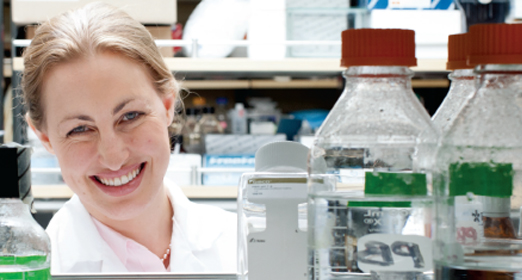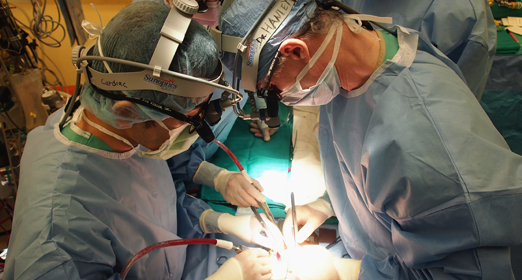The last 25 years have transformed the ways in which we prevent, diagnose, and cure childhood diseases. Your support has helped translate promising scientific discoveries into groundbreaking treatments for children and expectant mothers.
Your belief that we can—and must—do better for sick children inspires us and pushes us forward every day. Through our collaboration with Stanford School of Medicine, Stanford University, and Silicon Valley, our hospital is truly at the intersection of world-class science and unparalleled clinical care.
Along the path of discovery, it is often donor support that accelerates momentum toward better care and cures. Each of the advances highlighted here is the result of decades of donors and partners like you who have invested in our work and in our patients.
Research Highlights
- First steroid-free, immune-suppressing drug regimen for organ transplant recipients
- First effective oral immunotherapy to simultaneously treat multiple food allergies
- Youngest patient to use a Berlin Heart device as a bridge to heart transplant
- First-ever scarless splenectomy, performed through the belly button
World-leading brain tumor research
Michelle Monje, MD, PhD, is leading internationally recognized research into the biology of diff use intrinsic pontine glioma, the deadliest childhood brain tumor, which has a five-year survival rate of only 1 percent. Recently, her team identified an existing drug that may be able to prolong the lives of children with this brain tumor.
First-of-its-kind surgery for complex heart conditions
Cardiothoracic surgeon Frank Hanley, MD, developed a novel surgical procedure—called unifocalization— to create normal pulmonary arteries from the abnormal major aortopulmonary collateral arteries in cases of tetralogy of Fallot, a congenital heart disease. His dramatic success in improving outcomes has brought affected infants and children from across the nation to our hospital.
Eradicating disease for children around the world
Yvonne Maldonado, MD, leads research into how to prevent infectious disease transmission to children around the world, including studying how to reduce passage of HIV from affected pregnant women to their babies, and how to use existing polio vaccines to improve worldwide polio eradication efforts.
Leading change in adolescent medicine
Iris Litt, MD, is a pioneer in the field of adolescent medicine that focuses on the specific medical and developmental needs of adolescents. Our team maintains leadership roles in research, advocacy for teens and underserved young people, and innovative approaches for the treatment of eating disorders.
Safer prenatal diagnosis
Stephen Quake, DPhil, developed a non-invasive method for using maternal blood to diagnose certain genetic conditions in the fetus, such as trisomy 21 (Down syndrome). The method gives women information early in their pregnancies, without the risk of miscarriage associated with older tests such as amniocentesis and chorionic villus sampling.
This article first appeared in the Spring 2016 issue of Lucile Packard Children's News.

